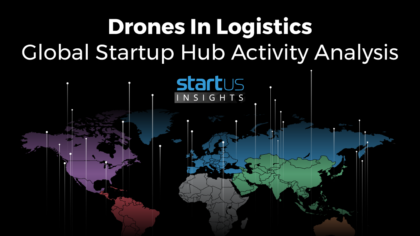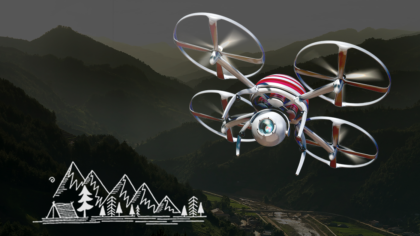The logistics industry is going through rapid digital transformation. Some of the major trends in the industry include increasing adoption of artificial intelligence (AI), the internet of things (IoT), advanced robotics, and drones. Large warehouses, structured pathways with little human activity and significant improvements in supply chain productivity push emerging companies to develop diverse drone-based solutions.
One of the biggest challenges facing drone use in logistics is government regulation. However, policymakers have begun allowing drones to be used for medical deliveries from hospitals and testing laboratories in countries that are in various stages of development. Furthermore, the benefits of rapid medical responses overshadow some other challenges for large-scale drone usage. Privacy and security of airways, along with route planning and the supporting drone infrastructure, still prevent the regular use of drones for last-mile package and courier deliveries.
Top 5 Global Drone Startup Hubs In Logistics
Using our StartUs Insights Platform, we analyzed the geographic distribution of the global activity of drones in logistics. We identified 24 regional hubs* that observe high activity in developing unmanned aerial vehicles (UAVs) for logistics and supply chain solutions.
According to our data, Silicon Valley, London, Los Angeles, New York City, and New Delhi are home to 98 startups and emerging companies* accounting for 26% of global activity. Let us have a look at some of the innovative drone startups impacting logistics from these 5 top hubs.
According to our data, two-thirds of all global activity for drones in logistics occur in North America and Europe. With more than 20 hubs for drones accounting for 40% of all emerging companies, technologically advanced countries lead the way with drone development. A combination of clear regulation and investment in drones, as well as its supporting infrastructure, enables the wider adoption of drones in logistics.
Emerging technology hubs across Asia and Australia develop a fifth of all drone-based solutions in logistics. Most activity happens in major urban centers across the region like Dubai and Bangkok as well as Melbourne. Further, with wide-reaching benefits of delivering essential medicine and vaccines, Africa also sees an increasing number of drone delivery solutions.
#1 Silicon Valley | 36 Startups & Emerging Companies
Like in most places around the world, Silicon Valley also deals with cumbersome drone regulations regarding sharing airspace and safety measures. However, emerging companies are finding ways to innovate within these frameworks in order to boost the adoption of drone-based deliveries. The FAA, the USA’s airspace authority, is still working on regulations for drones that would see them being used more widely for logistics purposes.
Elroy Air is a San Francisco-based startup developing autonomous heavy-duty drones for commercial logistics use. The startup’s end-to-end aerial cargo delivery drone holds a maximum of 225 kg (500lbs) and has a range of 500 km (300 miles). Additionally, the autonomous flight system is enhanced by autonomous cargo handling and the drone employs a hybrid electric powertrain and does not require airport space or charging stations.
#2 London | 25 Startups & Emerging Companies
One of the main challenges facing British drone regulators is to allow safety and standards testing for flying beyond the visual line of sight. As logistical drones require traveling autonomously over significant distances, emerging drone solutions have a limited scope for innovation. Other restrictions on where drones can operate also stifle companies from buying drones for various last-mile delivery and logistics purposes. However, the UK has one of the world’s leading air-traffic safety regulations and is working to bring the same expertise to drone regulations.
Operating from Oxford, Animal Dynamics is a startup experimenting with drone technology inspired by various animals’ natural movements. The company’s most advanced solution, with a capacity of more than 150 kg (330 lbs), is the Stork series of unmanned aerial vehicles that are inspired by the flight of storks. Besides, their drone requires a very short take-off and landing space and different payload capabilities also make this an ideal option for various applications including logistics and agriculture.
#3 Los Angeles | 14 Startups & Emerging Companies
Startups and emerging companies in Los Angeles are investing heavily in urban drone-based technologies to create new modes of efficient and safe transportation of goods, and even people, in one of the world’s most congested cities. The region is already an innovation hub for technology-based transit solutions and drones are also quickly becoming a part of this cluster. Moreover, aerial logistics startups from this region already provide solutions for warehouses.
Hailing from Moorpark near Los Angeles, Auterion is a startup looking to solve the feasibility challenges facing increased drone use. More than the drone itself, efficient management of drone fleets make the technology cost-effective for companies looking to deploy. The Auterion Enterprise PX4 software plans cargo delivery flight, executes it using a wide range of drones, monitors the individual flight or the entire fleet in real-time, and lands the drone safely. Further, the end-to-end platform easily integrates with the logistics backend by using APIs and SDKs.
#4 New York City | 14 Startups & Emerging Companies
New York City has one of the most congested airspaces in the world. High volume flight traffic to and from its biggest airports restrict the use of commercial drones for logistics operations. However, it still allows startups and emerging companies to develop several innovative drones and related technologies to operate within the flying authorized zones. There is encouragement that when regulations are updated to include drone use, New York City will see an increased number of drone-based logistics solutions as and when regulations are updated.
Based in Ridgefield, about 100 km (60 mi) north of New York City, Target Arm is a startup developing a universal launch and recovery platform for unmanned aerial vehicles. TULaR is made for the last-mile package and courier delivery by allowing drones to operate out of moving vehicles. This allows clients to use smaller and more affordable drones to carry out efficient last-mile delivery services. Besides commercial applications, TULaR also caters to military applications.
#5 New Delhi | 9 Startups & Emerging Companies
Indian logistics capacities are constantly expanding. Startups and emerging companies and even the biggest names in the Indian logistics industry, all experiment with advanced technologies to improve efficiency. Like everywhere else, New Delhi also understands the benefits of drones in logistical operations, however, they are yet to employ any comprehensive regulations. As Indian consumers demand more from eCommerce players and expect faster delivery services, drone use is also likely to increase. Reducing road congestion also plays a big role in the government’s considerations for using aerial logistics solutions.
PS-1925 is an Indian startup based out of New Delhi, working on a variety of drones keeping in mind the Indian market. The company’s Courier PS-1925 is a package delivery drone intended to replace numerous two-wheelers and trucks that currently transport eCommerce goods. PS-1925 also develop the medical delivery drone Chikitsa-1925 that is able to expedite the delivery of medicines, blood, and organs to hospitals and other accident sites.
What’s Next?
As different regions around the world start realizing the benefits of drone-based logistics and supply chain, it gives rise to more startups developing innovative drone solutions. Regulators play a major role in going forward as they bring order to air routes and drone sizes. Startups and emerging companies also play an important role in ensuring their products and solutions have little scope for misuse. With safeguards and policies in place, the future of the skies looks set to be buzzing with numerous drones varying in size, capacity, range, as well as purpose.
*A hub is defined as the regional geographic center of activity for this topic. It covers the center point with a radius of 100 km (62 mi). We define startups & emerging companies as those founded after 2010.








